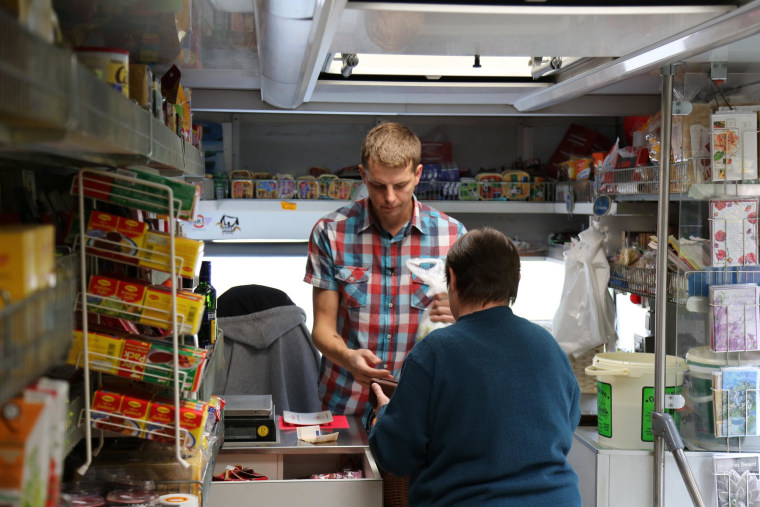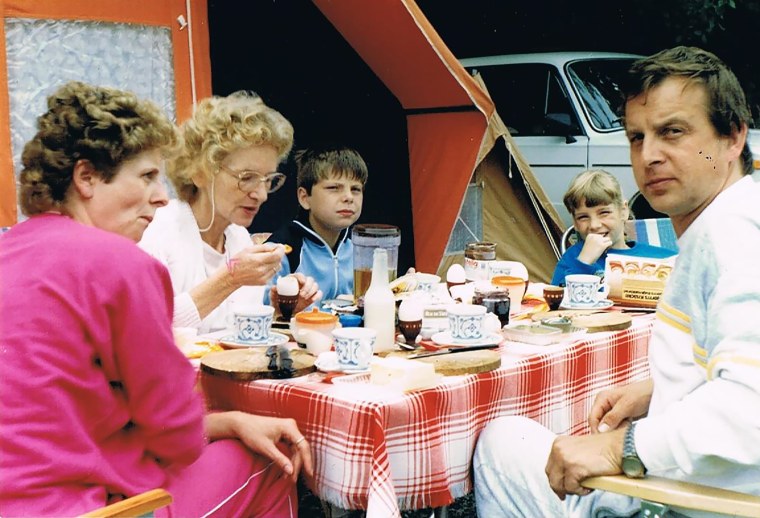GLEBITZSCH, Germany — Half a dozen elderly people emerge from communist-era apartment block and nearby houses as Manfred Reiche’s supermarket-on-wheels arrives.
Very few people roam the quiet streets of the former farming town in what was once East Germany. Glebitzsch lost its main meeting place, the local restaurant, shortly after the fall of the Berlin Wall fell 25 years ago this weekend. Its residents rely on Reiche’s mobile grocery store for their weekly shopping.
While trillions of dollars have poured into the East to rebuild infrastructure in parts of the country that spent decades behind the "Iron Curtain," some complain that a gap is still evident.
“Before the fall of the wall, we were working, so everything was easier," says 75-year-old Ingrid Stumpe as she put goods into a little basket in Reiche’s van. "But later, everything went downhill."
Unemployment, for example, stands 9.7 percent in the East compared to 6.0 percent in the West. In some eastern towns the jobless rate is as high as 12 percent.
“There are mostly old people here now," added Margot Rose, 77. "The young are in the West to work."
While the majority of the town's have been renovated and feature garden fences alongside neatly trimmed front lawns, old run-down buildings and abandoned farms serve as a reminder that prosperity hasn't reached everyone in economic powerhouse Germany since the fall of communism.
“Here In the countryside, there are no more restaurants and no more shops," Stumpe added. "There were several attempts to open new ones, but all have failed."
Statistics back up Rose's assertion. A large number of young people moved out of the eastern villages after the fall of the wall, seeking jobs in the West. They often left their parents behind.
“In many cases, the fathers died and the elderly mothers do not have a driver’s license today,” says Reiche, who owns the mobile supermarket. “All the grocery stores in these small villages, which used to be the [East German] Konsum chain are gone because they were not economically fit, nobody could run them anymore.”

According to a study published this week by the IfW economic research institute, 1.9 million people migrated from eastern German regions to the West between 1990, the year of German reunification, and 2013. But last year's figures show net migration between the regions is now negligible. However, lower birth rates, the previous exodus and an aging population are adding to the East's woes.
The rural exodus and the introduction of large supermarkets after the fall of the wall also had a negative impact on Reiche’s family business. But in 1999, the entrepreneur identified a niche and launched his supermarket-on-wheels. It travels between economically struggling towns in the region where his family has been running a small food and household goods store since 1930.
For nearly 40 years of communist rule, Reiche’s family felt the oppression and economic mismanagement of the East German regime. The grocery store that Reiche's father had turned into a successful business was nationalized in 1953 and family members were forced to become employees of their own shop. Even though many products, such as bananas, were always rare or at times, even impossible to get, Reiche said he managed “to find goods that other stores did not immediately have.”
“And we still ran the supermarket as if it was a private business," he said. "It went well for us. But in later years we learned from my secret Stasi files that we were under constant surveillance by the government."
For years, East Germany’s Stasi secret police had regularly gathered information on Reiche, who often openly criticized the state-directed economy and East Germany’s political leadership. “When I learned from the 50-page file that my former school teacher, who was a close friend of my parents, and a school mate spied on me, the friendships ended quickly,” Reiche said.
In 1989, the year of the peaceful revolution in East Germany, trouble mounted for the merchant and his family when his famous sister-in-law — four-time Olympic gold medalist Kornelia Ender — and her husband decided to escape via Hungary to the West. “The secret police pulled me out of a hairdresser appointment and questioned me for hours,” Reiche’s wife Petra recalled. Only two days before their flight, Ender, an East German swimming champion, had informed her sister about her plans during a family vacation in Bulgaria.

Reiche believes that he was also monitored while participating in the famous Leipzig demonstrations in October 1989, where he joined tens of thousands to protest against the regime. “I am glad that our peaceful uprising eventually led to change,” Reiche said.
After the fall of wall, Reiche’s business was privatized again and today he proudly emphasizes that he is “without any debt.” He is working on handing over more responsibility to his 36-year old son Mark, who now regularly drives the rolling supermarket around.
Reiche says that many parts of former East Germany have turned into the "blooming landscapes" that onetime chancellor Helmut Kohl promised. The nearby city of Bitterfeld, for example, once a dirty, stinking industrial ruin has been turned into a flourishing business environment including solar energy firms and start-ups.
Before the fall of the wall, Bitterfeld was known as a highly polluted city due to its production of chemicals, pesticides, plastics and other toxic products. The so-called Chemical Combine at Bitterfeld, which consisted of 80 individual factories, generated more than 4 percent of East Germany’s state income. Following a rapid clean-up phase, Bitterfeld today hosts 360 firms and provides jobs to more than 11,000 people.
And after decades of open-cast mining in the region, the landscape was transformed in the 1990s to include four lakes that have been turned into recreational areas. “There are vacation homes, nice restaurants there now and it is often referred to as the Bitterfeld Riviera,” Reiche added.
And Leipzig, where Reiche took his protest to the streets, is now often considered as more hip than even vibrant Berlin.
But Reiche also admits that some regions in the East are still struggling, even 25 years later.
“The division between East and West in the minds of people will die off with the next generation,” Reiche said. “I estimate that it will take another 20 years before the economic differences are no longer visible.”